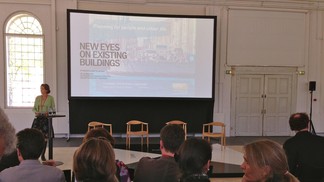May 24 2013
On May 15-16, 2013 the 5th International Daylight Symposium, themed « New Eyes on Existing Buildings » and organized by Velux, took place at the Royal Academy of Arts in Copenhagen, Denmark.
 © 2013 EPFL
© 2013 EPFL
It was preceded by the 2nd Academic Forum for PhD students working on daylighting issues on May 14. Prof. Marilyne Andersen, head of the LIPID laboratory at EPFL, was invited as moderator for the whole symposium and as leading scientific researcher for the Academic Forum. Three PhD students from LIPID, Maria Amundadottir, Mandana Sarey Khanie and Siobhan Rockcastle, were selected to present their work both during the Forum and in poster format during the symposium.
The symposium covered topics ranging from the infinitely large – with a poignant welcome presentation at the Tycho Brahe planetarium on our universe’s « First Light » by astrophysicist Michael Linden-Vørnle – to highly specific issues pertaining to daylit buildings at the urban, building, façade component and occupant health scales. Ongoing work at LIPID is particularly relevant to several of these aspects. The presented PhD topics included advances in our understanding of view direction dependencies for discomfort glare perception in daylit workspaces by resorting to objective eye-tracking data (by M. Sarey Khanie), the development of a new mathematical and computational model to integrate non-visual effects of light (e.g. on our biological clock and alertness, thus ultimately our health) into building simulation frameworks (by M. Amundadottir), and the investigation of the dynamic visual effects of daylight in architectural spaces (e.g. regarding contrast due to moving sunlight patches) as part of the decision metrics toolset for designers (by S. Rockcastle).